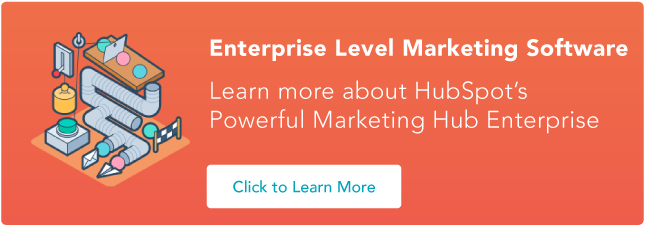Healthcare businesses use AI and automation to provide a better experience for their customers, patients, and care providers.

The healthcare industry has been through one of its busiest and most challenging periods, leaving healthcare professionals and companies burnt out.
With automation and AI, healthcare businesses are streamlining processes, reducing the workload for their team, and improving patient experiences.
I reached out to healthcare professionals and asked how they’re using AI and automation, their tips for getting started with AI, and the tools that healthcare businesses should consider.
Table of Contents
Companies Already Using Automation [+ Examples]
Marketing automation can free your team from laborious tasks, streamline operations, save thousands per year, and provide a better experience for customers and patients.
The healthcare industry benefits from automation and AI. Below, we’ll recap how companies are using AI today. From there, we’ll focus on tools that can help specifically with marketing.
Samaritan Health Services
Samaritan Health Services uses Azure AI to improve workflow and patient experience.
The company first turned to Azure AI to better serve patients. Finances were also a major motivator.
Scott Morris, AVP at Samaritan Health Services, is quoted saying, “Our health system supports a lot of rural areas and has a payer mix with a majority of Medicare and Medicaid payers… With the healthcare industry going through a lot of challenges, financial sustainability is a key point. We continue to believe that Epic on Azure is the best choice for us.”
As well as its financial benefits for Samaritan Health Services, Azure AI improves access to data for the right professionals.
Sonney Sapra, senior vice president and CIO at Samaritan Health Services, is quoted saying, “By using automated workflows, we can get the right data to the right person at the right time to make key health decisions.”
Macleod Trail Dental Clinic
Jennifer Silver, an experienced Dentist and Owner at Macleod Trail Dental Clinic, uses AI for appointment reminders, image analysis in diagnostics, and virtual consultations.
Silver says, “Automatic reminders enhance patient attendance, AI-driven image analysis improves diagnostic accuracy, and virtual consultations provide accessible and efficient communication.”
Automatic reminders are an opportunity for businesses to nurture their existing customers. This form of marketing automation is genuinely useful to customers, makes them feel cared for, and contributes to customer retention. It helps build the business’s reputation and may influence word-of-mouth referrals.
When asked how healthcare professionals in dentistry can optimize workflow with AI-driven analytics, Silver suggests exploring AI-driven analytics platforms. She says, “These tools can analyze vast amounts of patient data, helping you identify trends, predict patient needs, and optimize treatment plans.”
According to Silver, the major benefits of these AI systems are “[Streamlined] practice management, allowing for a more personalized patient experience and optimizing overall operational efficiency.”
Silver says that by harnessing the power of AI in data analytics, you can make more informed decisions, enhance treatment outcomes, and streamline the overall workflow of your practice.
“Embracing AI in this capacity contributes to improved patient care and empowers you to stay at the forefront of the rapidly advancing healthcare landscape,” she adds.
The Lung Institute
Christine Kingsley is a U.S. Advanced Practice Registered Nurse (APRN) and the health and wellness director of the Lung Institute. Kingsley uses AI to improve patient consultations.
Christine Kingsley credits AI for reducing team burnout. During the pandemic, the team at Lung Institute were working during devastating times.
Kingsley says, “As we specialize in pulmonology, the pandemic was pretty devastating for us. Everyone was burnt out, and even the simplest tasks took a lot of time. These simple tasks are mostly administrative processes, such as documentation.”
AI tools can take a lot of administrative tasks off of humans. This means teams and people can spend more time doing what they love or have the emotional capacity to manage the pressure during the busiest and most stressful times.
When asked about leveraging AI, Kingsley advises you to take the leap. She says, “Don’t be afraid to try out AI tools at your disposal because it’s a good first step in reducing the gap in the healthcare industry. Take the leap, but take one small step at a time.”
Carta Healthcare
Matt Hollingsworth, co-founder of Carta Healthcare, uses AI to improve operations.
He says, “Nurses are facing the challenges of antiquated processes and short staffing while burdened with patient data management — provide the best patient care. We could dramatically decrease the stress on nurses today by better managing the operations side of our healthcare system.”
Hollingsworth notes that AI can help run operational systems more efficiently, so nurses don’t have to spend hours at a computer inputting and analyzing patient data.
The service provided in healthcare can only be as good as the morale of the medical experts. Using automation and AI to support nurses and healthcare providers will benefit everyone.
Personal RX
Lawrence Margolis, CEO and Founder of PersonalRX , uses AI for translation.
PersonalRX is using AI internally to improve patient touchpoints. When it comes to marketing automation, PersonalRX uses AI for language translation. Founder Lawrence Margolis expressed the importance of the human touch between patient and medical expert.
He says, “At PersonalRX, we still believe human contact is incredibly important when speaking with a nurse, doctor, or pharmacist. We consider personalized service and one-on-one communication critical to good healthcare.”
PersonalRX keeps human contact where it’s most valuable, but this hasn’t stopped them from exploring AI.
Margolis says, “We are designing AI to get ahead of patient touch points for efficiency and building better technology to improve upon our already robust medication reconciliation process, MedRec2.”
On the subject of marketing, Margolis finds AI is useful for translation. He says, “We utilize AI for language translation to more effectively communicate with people likely to become a PersonalRX patient.”
Margolis plans to use AI for translations to meet the needs of multilingual patients. That includes “using it in delivery text alerts, email updates, and when sharing medication information while maintaining a human touch through native language speakers across our pharmacy.”
Tools That Can Help
There are a lot of marketing automation tools that help you streamline your healthcare business. I reached out to healthcare professionals to gather their favorite recommendations.
1. DAXapp
Christine Kingsley is cited above. As the Director of the Lung Institute, Kingsley needed a tool to remove some administration pressure from her team to prevent burnout.
DAXapp is recommended by Kingsley. She says, “This app made admin tasks a lot easier, reducing the tasks we needed to do daily. I think DAX is also being used by many other local clinics and hospitals because it’s a good app for fighting administrative burdens in the healthcare industry.”
Kingsley says her team uses DAX mostly for transcription.
“We usually deal with patients with lung issues; consultations can take a long time, especially if a patient has been suffering from a certain disease,” she says. “In these cases, you want to listen to the patient–not take notes while they’re talking. This is where DAX makes itself very useful.”
Using AI in this way ensures patients get a better experience with their healthcare provider. Providers can be more present and engaging with the patient. This use of AI is an excellent example of how automation improves patient and healthcare-provider relations.
AI Features for Healthcare
- Conversational AI
- Generative AI
- Ambient AI
Core Features
- The AI healthcare assistant helps provide a better patient experience. Using ambient AI and Large Language Models (LLMs), healthcare providers can rely on DAX to capture patient consultations, including complex multi-person conversations
- The benefits above support healthcare providers by taking some of the administrative load
- Conversations are sent to the cloud with the click of a button, and the output is a high-quality document that healthcare practitioners can add to medical notes later
Pricing
- Free mobile app
2. Microsoft Azure
Pareen Sehat, MC, RCC at Well Beings Counselling, recommends exploring Microsoft’s Azure AI. Sehat credits the platform with providing reliable healthcare information.
She says, “It is a cloud-based service. It quickly provides reliable healthcare information. It is sourced from authorities like the FDA and the NIH.”
Sehat says features like text help clinicians with patient history.
“It simplifies reports for patients and flags errors in radiology reports. It’s available in pay-as-you-go and subscription plans. This makes it a valuable tool for improved patient care,” Sehat says.
AI Features for Healthcare
- Generative AI
- Azure AI prompt flow
Core Features
- Generative AI is used by healthcare providers, such as Samaritan Health Services (aforementioned), for patient communications
- Automated workflows support healthcare businesses with data management
- A workflow helps ensure that the right people are seeing the data at the right time so the best decision is made in a timely manner
Pricing
3. Chatbots
Chatbots were recommended by healthcare professionals as a form of marketing automation to improve customer service.
Michael Green, co-founder at Winona, uses Chatbots on the site to guide and improve the customer experience.
Green says, “The chatbot bubble can act as FAQs and customer support, suggest relevant articles or products, and collect data and statistics to accurately suggest relevant content or guidance.”
Green notes that chatbots allow customers to communicate with someone immediately.
“Whether they’re asking about common side effects, educational articles, or for help with administrative support, the chatbots have helped us triage and serve customers faster,” Green says.
Chatbots bring more value to the patient. The option to self-serve allows customers a faster route to getting the information they need, another benefit to the customer.
Green states that chatbots improve customer interactions. He says, “Partially, we can screen these [questions] with our chatbots to best prepare the appropriate teams or doctors. Be prepared for customers’ concerns and lead with curiosity before offering any feedback.”
AI Features for Healthcare
- Conversation AI
Core Features
- Build a chatbot for your website without any code
- Personalize chatbot replies when used in conjunction with HubSpot CRM
- Conversational AI emulates human conversation so you can talk to your customers 24/7
Pricing
- Free to get started with HubSpot’s Sales Hub
- Starter packages are $18 a month
- Professional $450 a month
- Enterprise $1,500 a month
4. Merative AI
Sarah Boss, a psychiatrist, psychotherapist, and Clinical Director at THE BALANCE Luxury Rehab Clinic, recommends Merative AI.
Merative AI offers AI solutions tailored for the healthcare industry. Boss recommends it for managing health-related data.
Boss says, “This tool provides comprehensive analytical solutions for the healthcare sector, with a primary focus on patient-centric data. It customizes treatment plans based on data and utilizes AI for medical diagnosis. Moreover, it ensures the security of patient data and compliance with regulatory standards.”
AI Features for Healthcare
- Integrated data
- Dashboard segmentation
Core Features
- Save time with administration by streamlining workflows and access to information
- Integrated data to help make the treatment for patients possible
Pricing
- Each solution has its own pricing matrix
- All solutions can be demoed free of charge at your request
5. HubSpot’s Marketing Automation Software
Healthcare businesses need a trusting relationship between patients and healthcare professionals. If patients trust a professional, they’re more likely to open up about conversations about their health.
Marketing automation is one method to help you build trust. Alongside personal appointment reminders, as mentioned above, healthcare businesses can keep in touch with customers or prospective customers through marketing automation.
Using marketing automation software, you can build workflows that target specific groups or automate routine tasks.
AI features for Healthcare
- ChatSpot helps HubSpot users navigate to reports and data using natural language processing
Core Features
- Use workflows to create marketing automation campaigns that run in the background so you can focus on patients
- Automate routine and administrative tasks
- Nurture patients and customers through email, SMS, and more
Pricing
- Free to get started
- Prices for individuals start at $18 a month
- Prices for professionals start at $800 a month
6. ChatGPT
Kristie Plantinga, founder of Best Therapists, a directory of vetted therapists, encourages the use of ChatGPT for some elements of content creation.
Plantinga leads with an example relating to diagnostic criteria. She says, “Therapists do not need to list out the diagnostic criteria of depression from the DSM-V by memory; they can use ChatGPT to generate a list for them. “
However, Plantinga notes that human input is still essential. “Although therapists and other medical professionals must verify this factual information, it can still be a major time and headspace saver for content creators in the healthcare industry,” she says.
It’s important to note that Plantinga is recommending that medical professionals verify information for accuracy.
AI Features for Healthcare
- Generative AI
Core Features
- Use generative AI to help with content creation
Pricing
- Free to start
- $20 a month for ChatGPT plus
Trends to Know in Healthcare Marketing Automation
The healthcare industry is putting three groups of people first: medical experts, medical administrators, and patients.
For internal teams, there’s a focus on reducing administrative tasks to reduce burnout. It’s worth noting that these tasks are generally administration-focused, so one-to-one human connectivity is still possible where it’s important and arguably better due to better morale internally.
For patients, their experience is better for the automation and AI tools.
Appointment reminders reduce no-shows and keep medical practitioners serving patients. Reminders will increase attendance or prompt rescheduling so that someone else can take that much-needed slot.
AI and automation work within consultations to keep practitioners engaged with their patients.
There’s a lot of positive action due to AI and marketing automation in the healthcare industry. Take the leap, identify a pain point, and solve it with automation.






